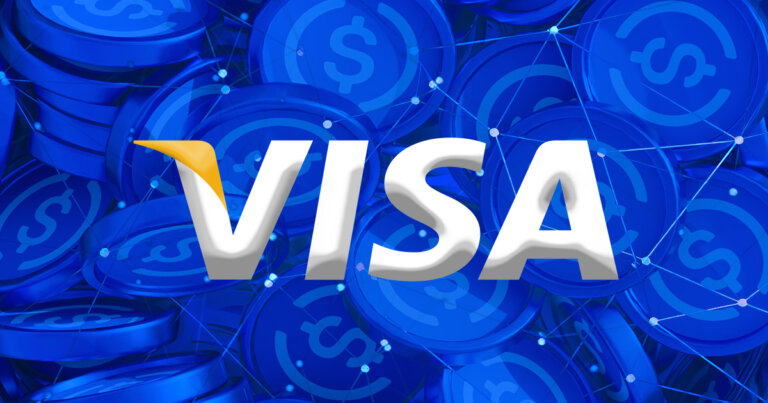 Visa expands USDC settlements to Solana blockchain in partnership with WorldPay, Nuvei
Visa expands USDC settlements to Solana blockchain in partnership with WorldPay, Nuvei Visa expands USDC settlements to Solana blockchain in partnership with WorldPay, Nuvei
Several traditional financial institutions are increasingly leaning into crypto.

Cover art/illustration via CryptoSlate. Image includes combined content which may include AI-generated content.
Payment giant Visa has broadened its USD Coin (USDC) settlement capacities to the Solana (SOL) blockchain while collaborating with merchant acquirers Worldpay and Nuvei, according to a Sept. 5 statement.
The move implies that certain merchants affiliated with WorldPay and Nuvei can now receive payments in USDC directly, instead of traditional fiat currency, when customers make purchases using their Visa cards.
Visa Head of Crypto Cuy Sheffield explained the significance of this in a thread on X (formerly Twitter). According to him, Visa has been testing USDC as a treasury option since 2021, when it partnered with Crypto.com for a live pilot.
This program enabled the payments company to accept settlements for the Crypto.com card program in Australia via the Ethereum network using a Visa-managed Circle account.
The company is implementing the same program on Solana and will use its dedicated Circle account to settle payments on-chain to WorldPay and Nuvei. This allows the service providers to settle their payments directly in stablecoins rather than fiat.
Crypto is penetrating traditional financial system
While there are still regulatory uncertainties surrounding cryptocurrencies, stablecoins have attracted more attention from these traditional players due to their similarities with central bank digital currencies (CBDCs).
PayPal announced last month that it will issue its Ethereum-based stablecoin, PYUSD, which Paxos will issue. The company said US dollar deposits, Treasuries, and other assets fully back the stablecoin.
Meanwhile, Mastercard also announced a CBDC Partner Program with several crypto companies, including Ripple and ConsenSys, to collaborate on CBDC developments.
Another traditional payments infrastructure firm, Swift, partnered with Chainlink for a tokenization experiment.
However, the interest from traditional players is not simply because of the novelty of blockchain technology. It is also because most of them recognize the potential for the technology to become a significant competitor.
London hedge fund Brevan Howard reported that USD-pegged stablecoins settled transactions worth $11 trillion in 2022. That is ten times the value of transactions handled by PayPal and only $0.6 billion less than transactions handled by Visa.
































































































